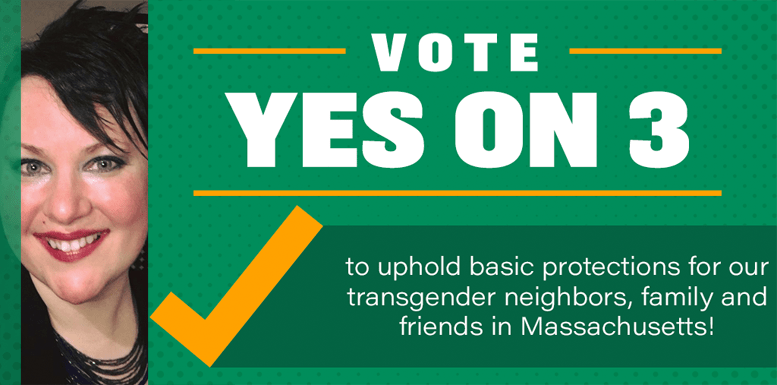By: Nicole Lashomb*/Editor-in-Chief—
The ballot initiative that would uphold transgender protections in public accommodations, or strip them away, goes to a popular vote in just two days. Since first launching the Yes on 3 campaign, it has gained massive traction throughout the state in every sector across the board. I applaud Freedom for All Massachusetts on their vigorous education and coalition building campaign to ensure that the transgender community continues to be respected and protected in public spaces in the Commonwealth. Yes on 3 has gained hundreds of businesses, non-profit organizations, public officials, educators, advocacy organizations, sports teams, and countless others, who stand fervently on the side of public accommodations protections for the transgender community.
Governor Charlie Baker first signed the prohibition of discrimination into law in 2016, after it had passed a substantial bipartisan supermajority in the Massachusetts legislature. It has remained the law to present day. Governor Baker also addressed (and “came out” in full support of) this important ballot question on page 3 of the October 2018 edition in an exclusive Op-Ed to The Rainbow Times. Baker hadn’t said a word about it to anyone statewide until this Op-Ed was published.
Now, to the specifics of the ballot and how it’ll be presented to all of us. Over the past months, there has been some confusion about the language of the ballot Question #3 and what exactly a yes or no vote means. According to Freedom Massachusetts website, here is how Question 3 will read:
“Do you approve of a law summarized below, which was approved by the House of Representatives and the Senate on July 7, 2016?”
The Summary
“This law adds gender identity to the list of prohibited grounds for discrimination in places of public accommodation, resort, or amusement,” read the website. “Such grounds also include race, color, religious creed, national origin, sex, disability, and ancestry. A ‘place of public accommodation, resort or amusement’ is defined in existing law as any place that is open to and accepts or solicits the patronage of the general public, such as hotels, stores, restaurants, theaters, sports facilities, and hospitals. ‘Gender identity’ is defined as a person’s sincerely held gender-related identity, appearance, or behavior, whether or not it is different from that traditionally associated with the person’s physiology or assigned sex at birth.”
The summary continues.
“This law prohibits discrimination based on gender identity in a person’s admission to or treatment in any place of public accommodation. The law requires any such place that has separate areas for males and females (such as restrooms) to allow access to and full use of those areas consistent with a person’s gender identity. The law also prohibits the owner or manager of a place of public accommodation from using advertising or signage that discriminates on the basis of gender identity.
“This law directs the state Commission Against Discrimination to adopt rules or policies and make recommendations to carry out this law. The law also directs the state Attorney General to issue regulations or guidance on referring for legal action any person who asserts gender identity for an improper purpose.
“The provisions of this law governing access to places of public accommodation are [and were] effective as of October 1, 2016. The remaining provisions are effective as of July 8, 2016.”
Yes on 3
And, it all boils down to this—by voting yes, you would be voting to keep the current law in place that prohibits discrimination against the transgender community in public spaces.
If you vote no, you would actively be voting to strip away all protections for the transgender community in public accommodations. Essentially, you would be encouraging the Commonwealth to write discrimination back into the law. In these cases, trans people could be kicked out of or refused service in places like restaurants, hospitals, stores, and so on just for being who they are.”
It’s quite basic, actually. Do you believe that people should be discriminated against for who they are or do you believe in equality? I’m voting yes for equality and to keep the laws in place that protect us all.
The Opposition
As we’ve seen in the past weeks, the opposition to equal treatment for the transgender community has reared its ugly head in full force. One of the central tactics often used by the opponents is to cite myths related to bathrooms and locker rooms. If that is your only hang up between voting yes or no, consider this.
It is not uncommon for trans people to be physically or sexually attacked, harassed and bullied in restrooms and locker rooms for simply being trans and living authentically each day. The transgender community is most at risk when using facilities, not the other way around. Living authentically and using the corresponding restroom or locker room that aligns with your gender identity is not relatable to a man using a women’s restroom/locker room or a woman using a man’s, as some have positioned it, including the opposition. That comparison negates what trans identity is entirely.
A trans person doesn’t choose their sex. It is not a preferred sex. It is simply who someone is from the time they were born. A trans man’s brain developed as male in the womb and a trans woman’s brain developed as female. Genitals do not determine gender; brain development and other physiological factors play this role. Trans men are men and trans women are women. Each person has a right to use the appropriate restroom/locker room that aligns with the corresponding gender identity. As matter of fact, a recent report published by the Boston Globe found that there was no link between the transgender rights law and bathroom crimes. Whenever you hear the opposition citing differently, you know that it is a political ploy set to pave the path to discrimination.
I highly recommend checking out the myths on the Freedom for All Massachusetts’ website to gain a comprehensive understanding of how exactly deceit and/or lack of information is used to cast doubt in the minds of voters.
The Trajectory
The Rainbow Times has covered this ballot initiative extensively since it first became public knowledge that such a measure was underway. In the beginning, it looked dismal and, frankly, I was deeply concerned that the law that protects thousands of transgender residents could indeed be repealed by popular vote—a gruesome concept where the public would actually be able to determine the civil rights and safety of a disenfranchised group. What once seemed like a close call, is finally polling in the right direction at a rampant pace.
As of a September 19 Boston Globe poll, 71.6 percent of those polled said they would vote “yes” if the election were today. In a more recent WBUR poll, Yes on 3 has 68% in its favor. That is still promising news since, in June, it was nearly an even split. As voters have become more informed about this initiative, and the more people that have signed on to the coalition, the more bright that beacon of hope looks as Massachusetts continues to move forward instead of resetting the clock.
The Rainbow Times has joined hundreds of others as a proud member of the Freedom for All Massachusetts’ coalition. However, any slip in numbers of support, as indicated in the polls cited above, should be a cause of concern and should elicit all of us to work harder, work smarter and work together to overturn this unjust referendum riddled in discrimination on Nov. 6. Although it is looking favorable for a Yes on 3 victory, stranger things have happened in politics, especially since 2016. We mustn’t take any apparent lead for granted and work on its success until the very last buzzer sounds.
“A 2014 survey revealed that 65 percent of transgender people in Massachusetts faced discrimination in a public place in the previous 12 months,” read Freedom Massachusetts’ website. And, that is precisely why this 2016 law needs to be upheld.
Vote Yes on 3. Lives depend on it.
*Nicole Lashomb is editor-in-chief of The Rainbow Times & Co-Founder of Project Out, a non-profit organization dedicated to the transgender community through providing life-saving services and financial assistance. She holds an MBA from Marylhurst University and a BM from the Crane School of Music (SUNY Potsdam). Nicole can be reached at editor@therainbowtimesmass.com.







